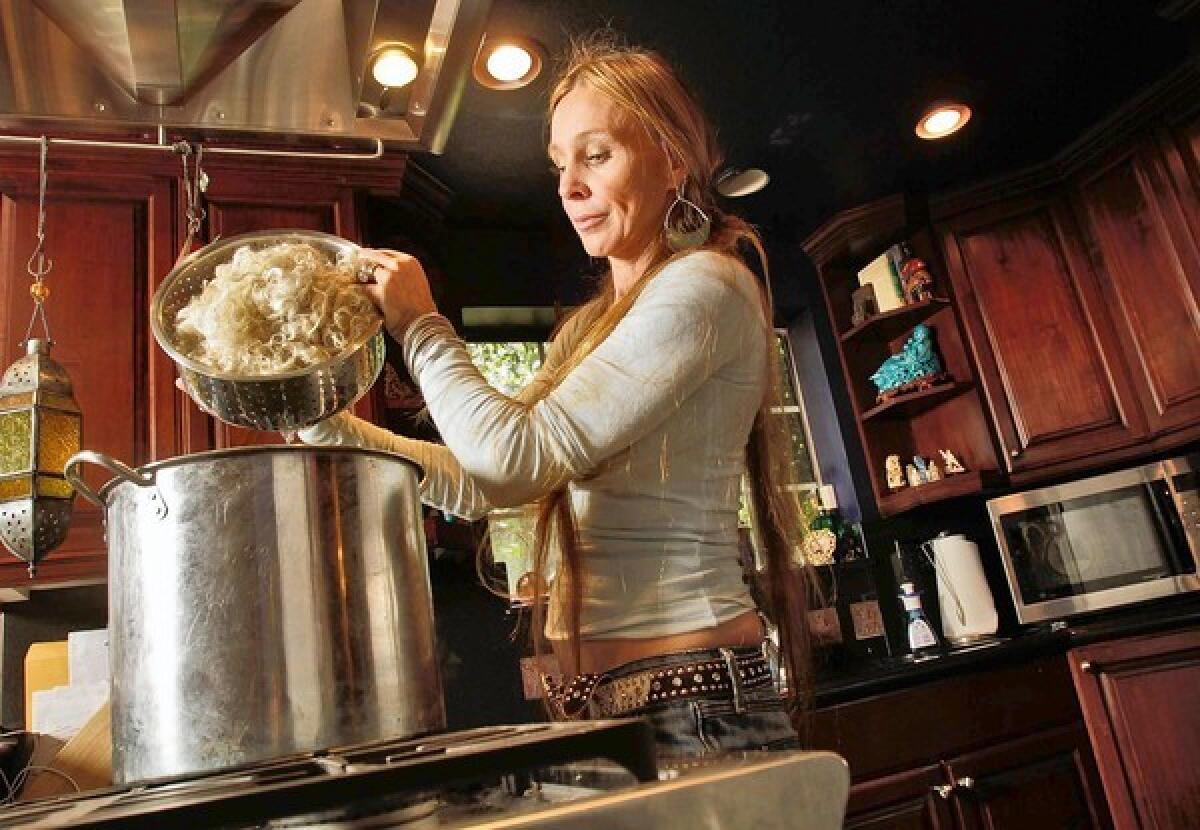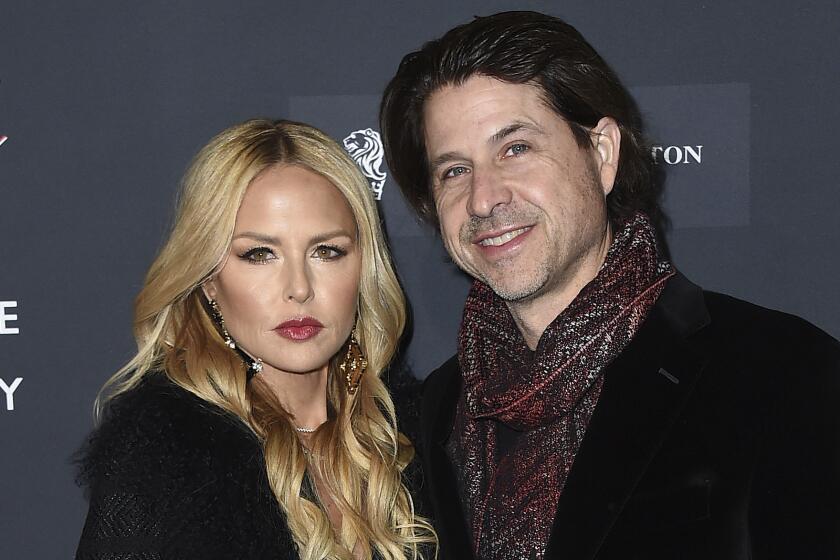Namaste Farms puts a different spin on yarn

Whether it’s a luxury automobile, a couture gown or a special vintage of wine, even those who aren’t collectors and connoisseurs recognize that perceived rarity and quality drive up demand. And price. But would you be willing to pay a premium price — say five times as much — for yarn? What if it was a luxurious, lustrous fiber, hand-sheared, -washed, -dyed and -spun from an award-winning sheep — all by the same woman — less than 100 miles southeast of Los Angeles?
You might not, but fiber enthusiasts will. That’s something shepherdess/spinner (she uses the term “fiber artist”) Natalie Redding found out last September when her Namaste Farms wools and fibers — feather-soft skeins of iridescent purples and blazing oranges, some dangling with Hello Kitty charms and beads — became available at the click of a mouse.
In fact, business is booming so much that Redding’s vertically integrated one-woman (with the assistance of husband, kids and a hired hand) small-batch fiber enterprise is bringing in almost enough to make the family’s 5-acre farm in Temecula wine country self-sustaining.
How the 47-year-old former model became a “yarn-treprenuer” mogul is a long yarn itself, and one that Redding starts to spin on a tour of her farm one sunny weekend, her wiry 5-foot-7, 122-pound frame clad in a pair of dark-wash William Rast designer jeans, a form-fitting white tank top and a pair of scuffed cowboy boots, with hair falling to her belt, wrists jangling with silver bracelets and face framed by earrings the size of parakeet swings.
“Yes, this is my standard fare,” she says when asked by a reporter if she actually tends to barnyard chores dressed that way. In the same breath, she says she wants to be taken seriously as a farmer and a businesswoman but refuses to fit anyone else’s stereotype. “What bothers people is that I just don’t look like an aggie [agriculture person]. I’m out there wearing Armani boots, designer jeans and a Prada belt, and I’m not wearing a men’s T-shirt. For some reason it disturbs them.”
The “them” Redding refers to are the people she says prejudged her and treated her poorly when she first started on the sheep- and goat-show circuit. “At my first show in 2006 everyone thought because I didn’t look like everybody else, I was a poser. And they said things like: ‘All you do is go out and buy the best animals.’ Why would I want to buy bad animals?”
That comment about buying the best animals touches on another hurdle to being taken seriously — the notion that somehow Redding was nothing more than a deep-pocketed backyard hobbyist embarking on a vanity project. After all, a Cadillac Escalade and a Porsche sit in the driveway of Namaste Farms, and a ramshackle bungalow in the barnyard holds enough professional equipment to equip a recording studio. It is, in fact, a functioning studio (dubbed “The Recording Farm”) used by her sound engineer husband Sean Redding, who happens to be the son of the late William “Jheri” Redding — the hairdresser, businessman and inventor of the Jheri curl.
Natalie met her future husband in 1992, after answering a help-wanted ad at a thoroughbred horse ranch, which it turned out Sean was managing for his father. Before that, in the early ‘80s, the Mendocino-born high school graduate had chosen Hong Kong over college, working there as a fashion model who supplemented her income as a cage-dancing cocktail waitress. Eventually Natalie Redding returned to California, went to college and earned bachelor’s and master’s degrees in animal science from Cal Poly San Luis Obispo.
It was horses that brought the Reddings to Temecula, but they started shifting to what Natalie calls “safer animals” when the couple began having children. For most of the decade in between they grew the farm with little in the way of fiscal restraint — buying and breeding the best stock money could buy, including angora and pygora goats and unique sheep breeds such as Gotlands, Babydolls and Wensleydale Longwools (with long, corkscrews of wool that look like a cross between Shirley Temple curls and dreadlocks),
She hired the best breeders and in 2006 paid an expert $175 a day for a week to teach her the art of dying and hand-spinning the wool.
Today, Namaste Farms boasts somewhere between 85 and 100 head of goats and sheep and a menagerie that includes llamas, cows, pigs and a flock of peafowl (including some prized Java Greens), turkeys, chickens (Buff Orpingtons, Marans and Speckled Sussex) and three incubators that are in the process of hatching 600 to 700 eggs at any given time.
“Yes, my husband comes from a wealthy family,” Redding says, “and Sean’s mom had pretty much been his benefactor.” But the economic downturn of 2007 and her mother-in-law’s failing health made Redding hyperfocus on turning her wool gathering into a real business
“I realized that the economy was tanking and we had five kids and I wanted to really make this work. And the good thing was that at this point, I already had all the tools I needed,” she says.
Although Redding started out selling her fiber through a few bricks-and-mortar yarn stores, the big leap forward for the burgeoning business came in September 2010 when she convinced one of the biggest online retailers of yarn and fiber to stock her hand-spun, single-ply long wool.
“The quality is absolutely superb,” says Deborah Knight, chief marketing officer for Yarnmarket, which runs Yarnmarket.com. “Natalie buys high-quality animals and breeds them herself and ends up with a very high-quality fiber. And she’s a good hand spinner.”
Knight declined to divulge specific sales, but would say that by the time they tallied 2010 year-end numbers, Namaste Farms ranked 50th out of their 80 yarn providers in sales.
“Within four months she was already 50th,” Knight says, “That isn’t just pretty good, it’s huge. Especially since everyone else we deal with is a huge yarn manufacturer that ships us hundreds and hundreds of bags — and she’s the only yarn producer we deal with that spins all her yarn by hand.”
Knight says that even taking into account the substantial difference in price (a comparable-quality machine-spun merino yarn retails for $21.85 for 110 yards at the site while Redding’s 40-yard skeins of the same sell for $44.85) the yarn has sold remarkably well.
Redding says that Yarnmarket also helped her design labels, packing slips and invoices — all things she hadn’t had before — and urged her to connect with the enthusiastic online fiber arts crowd through social media.
“When I started I was so riddled with self-doubt I didn’t even want them to pay me for the yarn I sent them,” Redding recalls. “And they told me to get on Facebook and to sign up at [online knitting community] Ravelry.com — I hadn’t done any of that.”
Today her frequently updated Namaste Farms Facebook page has 1,245 friends and she’s posted nearly two dozen YouTube videos offering tips on sheep shearing, wool dying and spinning, and tours of her farm.
So, in a way, Yarnmarket didn’t just give Redding a cyber-storefront and a chance at making Namaste Farms self-sustaining, it gave her a voice too.




